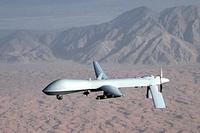-
New technology proves effective in thwarting cyberattacks on drones

Engineering researchers from the University of Virginia and the Georgia Institute of Technology have successfully flight-tested scenarios which could threaten drones, including ground-based cyber-attacks. The demonstration of U.Va’s System-Aware Cybersecurity concept and Secure Sentinel technology was part of a research project led by U.Va. engineers to detect and respond to cyber-attacks on unmanned aerial systems.
-
-
Invisibility cloak closer to reality: Concealing military airplanes, and even people

Since the beginning of recorded time, humans have used materials found in nature to improve their lot. Since the turn of this century, scientists have studied metamaterials, artificial materials engineered to bend electromagnetic, acoustic, and other types of waves in ways not possible in nature. Now, Hao Xin, a professor of electrical and computer engineering at the University of Arizona, has made a discovery with these synthetic materials that may take engineers one step closer to building microscopes with superlenses that see molecular-level details, or shields that conceal military airplanes and even people.
-
-
Yemen upheaval hobbles U.S. counterterrorism efforts there
Following the abrupt resignation of Yemen’s president, prime minister, and cabinet after Iran-backed Shi’a Houthi rebels took over the presidential palace, the United States has halted some counterterrorism operations against al-Qaeda militants operating inside the country. The move has dealt a blow to what President Barack Obama recently called a successful counterterrorism partnership between Yemen’s president Abd Rabbo Mansour Hadi and the United States. “The [Yemeni government’s] agencies we worked with . . . are really under the thumb of the Houthis. Our ability to work with them is not there,” said a senior U.S. official closely involved in monitoring the situation.
-
-
Revolutionary weapon to be showcased at Future Force EXPO
The Electromagnetic Railgun program continues to move toward scheduled at-sea testing in 2016. Its revolutionary technology relies on electricity instead of traditional chemical propellants, with magnetic fields created by high electrical currents launching projectiles at distances over 100 nautical miles — and at speeds that exceed Mach 6, or six times the speed of sound. The Railgun will play a significant role in the future of the U.S. Navy, and it will be on display to the public for the first time on the East Coast 4-5 February at the Naval Future Force Science and Technology (S&T) EXPO in Washington, D.C.
-
-
Smart grenade seeks, finds enemy hiding behind barriers, walls
The Small Arms Grenade Munition (SAGM) round — a 40mm counter-defilade, air-bursting grenade designed for both the M203 and M320 launchers — will undergo evaluation in July 2015. The SAGM allows a soldier to target an enemy who is protected behind a barrier and have the munition explode, in the air, above the target. The SAGM does not require the soldier to conduct any kind of pre-fire programming sequence. The soldier aims the weapon and fires, and the round detects where a wall is and then explodes, in the air, after passing the wall. The SAGM round has been under development since January 2012.
-
-
Reducing uncertainty in designing complex military systems
Uncertainty is sometimes unavoidable, but in the world of scientific computing and engineering, at least, what is worse than uncertainty is being uncertain about how uncertain one is. Understanding with confidence the level of uncertainty in computational models used for designing complex military systems can be enormously beneficial, reducing costs and development times. DARPA program seeks novel mathematical research for quantifying and predicting uncertainty in design models as alternative to costly and repetitive testing.
-
-
Terrorists develop tactics to evade U.S. drones
The CIA’s use of Predator drones against Islamic militants in the Middle East began shortly after the 9/11 attacks and has increased dramatically during the Obama administration. As the number of drone strikes in Yemen increased, AQAP militants began to develop tactics to hide themselves from a drone’s sensors.
-
-
Deadly debris: Northwestern U students report on U.S. landmine legacy
Despite a 20-year cleanup effort, the explosive remnants of war left behind by the United States after sustained military campaigns around the world continue to kill and maim thousands of people in Cambodia, Iraq, and other countries. Since 1993 the United States has spent $3.2 billion on efforts to clear unexploded ordnance, assist victims, and wipe out aging munitions stockpiles, but civilians are still dying and the “deadly debris” is inflicting incalculable damage on communities, regions, and entire countries.
-
-
Speedy, agile UAVs for troops in urban missions
DARPA aims to give small unmanned aerial vehicles (UAVs) advanced perception and autonomy rapidly to search buildings or other cluttered environments without teleoperation. The program aims to develop and demonstrate autonomous UAVs small enough to fit through an open window and able to fly at speeds up to twenty meters per second (45 miles per hour) — while navigating within complex indoor spaces independent of communication with outside operators or sensors and without reliance on GPS waypoints.
-
-
New cyber test range trains soldiers for simultaneous cyber and combat operations
A unique mix of training technologies sponsored by the Office of Naval Research (ONR) is preparing front-line soldiers to conduct cyber and combat operations simultaneously, as Marines demonstrated during a recent amphibious exercise off the coast of Virginia. During last month’s Bold Alligator exercise, Marines used ONR’s Tactical Cyber Range to emulate adversary communications hidden in a noisy, dense electromagnetic spectrum —as much a battleground in today’s digital world as any piece of land.
-
-
Turning deadly chemical warfare agents into harmless soil
Destroying chemical warfare agents in bulk is a challenge for the military and international community. Current methods of eradication, such as incineration or hydrolysis, create toxic waste which requires further processing. The logistics required to transport large stockpiles from storage to a disposal site can be risky and expensive. DARPA is seeking portable system that turns stockpiles of chemical warfare agents into dirt or other safe organic compounds without generating hazardous waste.
-
-
A first: U.S. Navy shipboard laser operates in Persian Gulf

The U.S. Navy announced that a laser weapon system (LaWS) — a cutting-edge weapon that brings significant new capabilities to America’s Sailors and Marines — was for the first time successfully deployed and operated aboard a naval vessel in the Persian Gulf. The operational demonstrations, which took place from September to November aboard USS Ponce (AFSB[I] 15), were historic not only because they showed a laser weapon working aboard a deployed U.S. Navy ship, but also because LaWS operated seamlessly with existing ship defense systems. During the tests, LaWS hit targets mounted aboard a speeding oncoming small boat, shot a Scan Eagle unmanned aerial vehicle (UAV) out of the sky, and destroyed other moving targets at sea.
-
-
Israel attacks targets in Syria to prevent advanced arms shipments to Hezbollah

Israeli jets bombed two military targets in Syria – one near the Damascus International Airport, the other near the town of Dima, north of Damascus and near the Syria-Lebanon border – and as has been the case in previous such attacks, there was no confirmation or elaboration from Jerusalem. Syrian general command sources said that several facilities had been hit, both at the Damascus International Airport and in the area of Dimas. This is the tenth Israeli attack against military depots in Syria since January 2013. The attacks have had a specific goal: to prevent the Assad regime and Iran from transferring advanced weapon systems to Hezbollah. When Israel’s intelligence services notice that such systems are gathered for the purpose of shipping them to Hezbollah, the shipments are destroyed before they are delivered to Hezbollah.
-
-
U.S. nuclear arsenal must be upgraded to maintain effective deterrence: Experts

Former military officers, academic strategists, scientists, and congressional leaders have recently been calling for the development of new nuclear weapons to replace the nation’s older, outdated stockpiles. Twenty-five years since the cold war ended, the U.S. nuclear arsenal has been significantly reduced to its current level of 4,804 nuclear weapons — from a peak of 31,000 weapons in 1967.As cooperation with Russia deepened in the 1990s, U.S. weapons complexes deteriorated. A recent “60 Minutes” story on the U.S. nuclear forces found that missileers charged with watching over and controlling Minuteman III ICBMs in Wyoming were still using floppy disks to store critical information. One expert arguing for shoring up and upgrading the U.S. nuclear deterrence says that “one of the reasons deterrence is so valuable is that it provides incentives for self-discipline in the behavior of states that otherwise cannot be trusted to behave peaceably.”
-
-
U.S. Army creates a Cyber branch

Soldiers who want to defend the nation in cyberspace, as part of the U.S. Army’s newest and most technologically advanced career field, now have an Army branch to join that will take its place alongside infantry, artillery, and the other Army combat arms branches. Army Secretary John McHugh and Chief of Staff Gen. Raymond Odierno approved the creation of the Cyber branch in September. “The establishment of a Cyber Branch shows how important and critical the cyber mission is to our Army, and allows us to focus innovative recruiting, retention, leader development, and talent management needed to produce world-class cyberspace professionals,” said Lt. Gen. Edward Cardon, the commanding general of Army Cyber Command.
-
More headlines
The long view
Factories First: Winning the Drone War Before It Starts
Wars are won by factories before they are won on the battlefield,Martin C. Feldmann writes, noting that the United States lacks the manufacturing depth for the coming drone age. Rectifying this situation “will take far more than procurement tweaks,” Feldmann writes. “It demands a national-level, wartime-scale industrial mobilization.”
